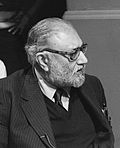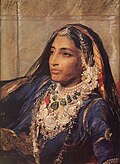Portal:Punjab/Selected biography
| This Wikipedia page has been superseded by Portal:Punjab and is retained primarily for historical reference. |
| Note: Article entries are now being transcluded directly on the main portal page. However, this page should be retained for historical reference. |
Usage
The layout design for these subpages is at Portal:Punjab/Selected biography/Layout.
- Add a new selected biography to the next available subpage.
- Update "max=" to new total for its {{Random portal component}} on the main page.
Selected biographies list
Selected biography 1
Portal:Punjab/Selected biography/1
Guru Nanak (Punjabi: ਗੁਰੂ ਨਾਨਕ (Gurmukhi), گرونانک (Shahmukhi)) (15 April 1469 – 22 September 1539) was the founder of Sikhism and the first of the ten Sikh Gurus. His birth is celebrated world-wide as Guru Nanak Gurpurab on Kartik Pooranmashi, the full-moon day in the month of Katak, October–November.Guru Nanak has been called "one of the greatest religious innovators of all time". He travelled far and wide teaching people the message of one God who dwells in every one of His creations and constitutes the eternal Truth. He travelled far and wide teaching people the message of one God who dwells in every one of His creations and constitutes the eternal Truth.He set up a unique spiritual, social, and political platform based on equality, fraternal love, goodness, and virtue.
Guru Nanak's words are registered in the form of 974 poetic hymns in the holy text of Sikhism, the Guru Granth Sahib, with some of the major prayers being the Japji Sahib, the Asa di Var and the Sidh-Ghost. It is part of Sikh religious belief that the spirit of Guru Nanak's sanctity, divinity and religious authority descended upon each of the nine subsequent Gurus when the Guruship was devolved on to them.
Selected biography 2
Portal:Punjab/Selected biography/2 Guru Gobind Singh (22 December 1666 – 7 October 1708), was the 10th Sikh Guru, a spiritual master, warrior, poet and philosopher. When his father, Guru Tegh Bahadur, was beheaded for refusing to convert to Islam, Guru Gobind Singh was formally installed as the leader of the Sikhs at age nine, becoming the last of the living Sikh Gurus. His four sons died during his lifetime in Muslim-Sikh wars – two in battle, two executed by the Mughal government.
Among his notable contributions to Sikhism are founding the Sikh warrior community called Khalsa in 1699 and introducing the Five Ks, the five articles of faith that Khalsa Sikhs wear at all times. Guru Gobind Singh also continued the formalisation of the religion, wrote important Sikh texts, and enshrined the scripture the Guru Granth Sahib as Sikhism's eternal Guru.
Selected biography 3
Portal:Punjab/Selected biography/3
Maharaja Ranjit Singh (Punjabi: ਮਹਾਰਾਜਾ ਰਣਜੀਤ ਸਿੰਘ), (13 November 1780 – 27 June 1839), was the founder of the Sikh Empire, which came to power in the northern South Asia in the early half of the 19th century. He survived smallpox in infancy but lost sight in his left eye. He fought his first battle alongside his father at age 10. After his father died, he fought several wars to expel Afghans in his teenage years, and was proclaimed as the "Maharaja of Punjab" at age 21. His Empire grew in the Punjab region under his leadership through 1839.Prior to his rise, the Punjab region had numerous warring misls (confederacies), twelve of which were under Sikh rulers and one by a Muslim. Ranjit Singh successfully absorbed and united the Sikh misls, took over other local kingdoms to create the Sikh Empire. He repeatedly defeated the invasions by Muslim armies particularly those arriving from Afghanistan, and established friendly relations with the British. Ranjit Singh's reign introduced reforms, modernization, investment into infrastructure and general prosperity
Selected biography 4
Portal:Punjab/Selected biography/4
Porus or Poros (from the Greek Πῶρος, Pôros), was a king of the Pauravas whose territory in Ancient Punjab spanned the region between the Hydaspes (Jhelum) and Acesines (Chenab) rivers in what is now the Punjab. Porus fought against Alexander the Great in the Battle of the Hydaspes, thought to be fought at the site of modern-day Mong, Punjab. Alexander was however greatly impressed by his adversary and not only reinstated him as a satrap of his own kingdom but also granted him dominion over lands to the south-east extending until the Hyphasis (Beas).After Alexander's death in 323 BC, Porus was assassinated by one of Alexander's generals named Eudemus sometime between 321 and 315 BC.
Selected biography 5
Portal:Punjab/Selected biography/5
Princess Sophia Alexandra Duleep Singh (8 August 1876 – 22 August 1948) was a prominent suffragette in the United Kingdom. Her father was Maharaja Duleep Singh, son of Maharaja Ranjit Singh known as the Lion of the Punjab, who abdicated his kingdom of Punjab to the British Raj due to political maneuvering by Governor-General Dalhousie in British India. He was exiled to England, where he converted to Christianity. Sophia's mother was Maharani Bamba Müller, and her godmother was Queen Victoria. A feminist, Singh lived in Hampton Court in an apartment in Faraday House given to her by Queen Victoria as a grace and favour. She had four sisters, including two stepsisters, and four brothers. Singh considered herself as an Edwardian lady with brown skin. In 1895, she and her sisters Princess Bamba and Princess Catherine were introduced as aristocratic debutantes at Buckingham Palace; all three were dressed in regal finery.During the early twentieth century, Singh was one of the leading South Asian women who pioneered the cause of women's rights in Britain. Although she is best remembered for her leading role in the Women's Tax Resistance League, she also participated in other women's suffrage groups, including the Women's Social and Political Union.
Selected biography 6
Portal:Punjab/Selected biography/6 Syed Abdullah Shah Qadri (Punjabi: سید عبداللہ شاہ قادری) (Shahmukhi), ਸਈਅਦ ਅਬਦੁੱਲਾ ਸ਼ਾਹ ਕਾਦਰੀ (Gurmukhi); 1680–1757) popularly known as Bulleh Shah (بلھے شاہ (Shahmukhi); ਬੁੱਲੇ ਸ਼ਾਹ (Gurumukhi)), was a Punjabi humanist and philosopher. His first spiritual teacher was Shah Inayat Qadiri, a Sufi murshid of Lahore.
Bulleh Shah's writings represent him as a humanist, someone providing solutions to the sociological problems of the world around him as he lives through it, describing the turbulence his homeland of Punjab is passing through, while concurrently searching for God. His poetry highlights his mystical spiritual voyage through the four stages of Sufism: Shariat (Path), Tariqat (Observance), Haqiqat (Truth) and Marfat (Union). The simplicity with which Bulleh Shah has been able to address the complex fundamental issues of life and humanity is a large part of his appeal.
Selected biography 7
Portal:Punjab/Selected biography/7 Jarnail Singh Bhindranwale (2 June 1947 – 6 June 1984) was the leader of the Sikh organization Damdami Taksal, and a notable supporter of the Anandpur Resolution. He advocated against the consumption of liquor, drugs and laxness in religious practices, such as the cutting of Kesh by Sikh youth.
Bhindranwale has been noted for strongly opposing prime minister Indira Gandhi for alleged policies against Punjab during Dharam Yudh Morcha (battle for righteousness). Later that year she ordered the attack on Golden Temple, Sikhism's most sacred Gurdwara, in Amritsar on the martyrdom anniversary of 5th Sikh Guru, Guru Arjan when the complex had pilgrims. Since his death, Bhindranwale has remained a controversial figure in South Asian history. While the Sikhs' highest temporal authority Akal Takht describe him a great martyr of the Sikh Nation, who made supreme sacrifice for the sake of faith, the Indian government views him as an extremist.
Selected biography 8
Portal:Punjab/Selected biography/8
Manmohan Singh (born 26 September 1932) is an Indian economist and politician who served as the Prime Minister of India from 2004 to 2014. The first Sikh in office, Singh was also the first prime minister since Jawaharlal Nehru to be re-elected after completing a full five-year term.Born in Gah (now in Punjab, Pakistan), Singh's family migrated to east Punjab during its partition in 1947. After obtaining his doctorate in economics from Oxford, Singh worked for the United Nations during 1966–69. Following the advice of International Monetary Fund in 1991, Singh as Finance Minister, freed India from the Licence Raj, source of slow economic growth and corruption in the Indian economy for decades. He liberalised the Indian economy, allowing it to speed up development dramatically. During his term as Prime Minister, Singh continued to encourage growth in the Indian market, enjoying widespread success in these matters. Singh, along with the former Finance Minister, P. Chidambaram, have presided over a period where the Indian economy has grown with an 8–9% economic growth rate.
Selected biography 9
Portal:Punjab/Selected biography/9
Harjit Singh Sajjan PC OMM MSM CD MP (born September 6, 1970) is a Canadian Liberal politician, the current Minister of National Defence and a Member of Parliament representing the riding of Vancouver South. He is the first Punjabi and Sikh to become Minister of Defence. Sajjan was first elected during the 2015 federal election, defeating Conservative incumbent MP Wai Young, and was sworn as defence minister into the Cabinet, headed by Justin Trudeau, on November 4, 2015. Before politics, Sajjan was a detective investigating gangs for the Vancouver Police Department and a regimental commander in the Canadian Armed Forces decorated for his service in Afghanistan. Sajjan was also the first Sikh-Canadian to command a Canadian army reserve regiment.Selected biography 10
Portal:Punjab/Selected biography/10
Mohammad Abdus Salam NI, SPk, KBE (Punjabi, Urdu: محمد عبد السلام; 29 January 1926 – 21 November 1996), was a Pakistani theoretical physicist. A major figure in 20th century theoretical physics, he shared the 1979 Nobel Prize in Physics with Sheldon Glashow and Steven Weinberg for his contribution to the electroweak unification theory. He was the first Pakistani and first Muslim to receive a Nobel Prize in science and the second from an Islamic country to receive any Nobel Prize (after Anwar Sadat of Egypt).Salam was a top level science advisor to the Government of Pakistan from 1960 to 1974, a position from which he played a major and influential role in the development of the country's science infrastructure. Salam was responsible not only for contributing to major developments in theoretical and particle physics, but also for promoting the broadening and deepening of high calibre scientific research in his country.
Selected biography 11
Portal:Punjab/Selected biography/11
Jagmeet Singh (born January 2, 1979), is a Canadian politician. He has represented the riding of Bramalea—Gore—Malton in the Legislative Assembly of Ontario since 2011 and served as deputy leader of the Ontario New Democratic Party from 2015 to 2017. He is the first turban-wearing Sikh to sit as a provincial legislator in Ontario, as well as the first to hold a deputy leader position in Canada. Before entering politics, Singh was a trial lawyer. Singh announced his intention to run for the leadership of the federal NDP on May 15, 2017.Selected biography 12
Portal:Punjab/Selected biography/12
Banda Singh Bahadur (Punjabi: ਬੰਦਾ ਸਿੰਘ ਬਹਾਦਰ), (27 October 1670 – 9 June 1716), was a Sikh military commander.At age 15, he left his home to become an ascetic, and was given the name Madho Das. He established a monastery at Nānded, at the bank of the river Godāvarī, where in September 1708 he was visited by, and became a disciple of, Guru Gobind Singh, who gave him the new name of Banda Singh Bahadur. Armed with the blessing and authority of Guru Gobind Singh, he assembled a fighting force and led the struggle against the Mughal Empire.
His first major action was to dismiss the Mughal provincial capital, Samana, in November 1709. After establishing his authority in Punjab, Banda Singh Bahadur abolished the zamindari system, and granted property rights to the tillers of the land. He was captured by the Mughals and tortured to death in 1716.
Selected biography 13
Portal:Punjab/Selected biography/13
Maharani Jind Kaur (Punjabi: ਮਹਾਰਾਨੀ ਜਿੰਦ ਕੌਰ) (1817 – 1 August 1863) was regent of the Sikh Empire from 1843 until 1846. She was the youngest wife of the first Maharaja of Punjab, Ranjit Singh, and the mother of the last Maharaja, Duleep Singh. She was renowned for her beauty, energy and strength of purpose and was popularly known as Rani Jindan, but her fame is derived chiefly from the fear she engendered in the British in south Asia, who described her as "the Messalina of the Punjab", a seductress too rebellious to be controlled.After the assassinations of Ranjit Singh's first three successors, Duleep Singh came to power in September 1843 at the age of 5 and Jind Kaur became Regent on her son's behalf. After the Sikhs lost the First Anglo-Sikh War she was replaced in December 1846 by a Council of Regency, under the control of a British Resident. However, her power and influence continued and, to counter this, the British imprisoned and exiled her. Over thirteen years passed before she was again permitted to see her son, who was taken to England.
In January 1861 Duleep Singh was allowed to meet his mother in Calcutta and take her with him back to England, where she remained until her death in Kensington, London, on 1 August 1863 at the age of 46. She was temporarily buried in Kensal Green Cemetery and cremated the following year at Nashik, near Bombay. Her ashes were finally taken to the samadh (memorial) in Lahore of her husband, Maharaja Ranjit Singh, by her granddaughter, Princess Bamba Sofia Jindan Duleep Singh.










